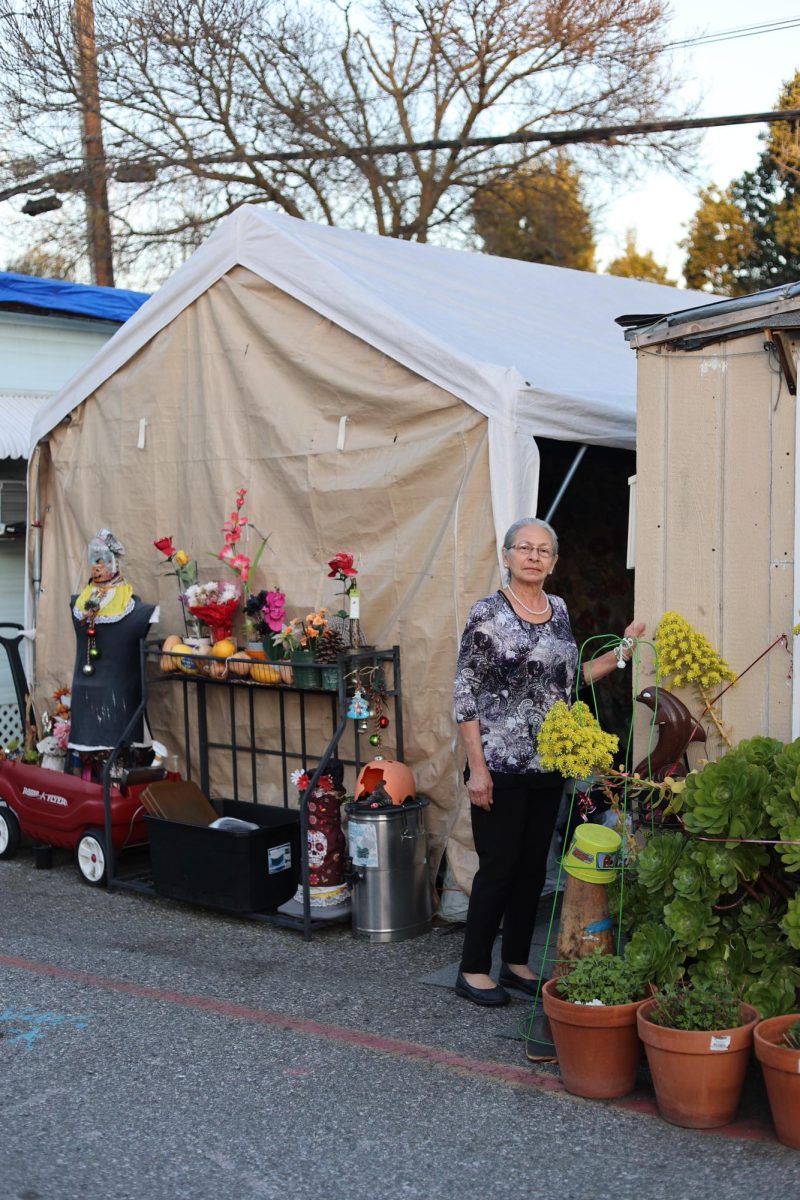Riding into the asphalt parking lot of Buena Vista Mobile Home Park on El Camino Real reveals a novel identity of its community and respective residents. Dogs bark for the attention of the unfamiliar and yet don’t seem particularly pleased about our arrival. An abundance of color sweeps down all three of the complex’s streets, as the striking height of overgrown greenery reaches out to the burning sun from the small outdoor pots they’re contained in.
And looking further down the street, the low whirring of the excavator outside acts as a reminder of the impending change coming to this small enclave in the heart of Silicon Valley.
Buena Vista stands out from the rest of Palo Alto. Once dubbed by the Wall Street Journal as “Palo Alto’s Endangered Trailer Park,” it’s an unusual sight in one of the nation’s richest zip codes.
According to the Santa Clara County Housing Authority, its population of around 270 residents are predominantly Latino and low-income. Some are families whose kids go to Gunn High School, evident by stickers plastered on windows, small shoes outside doorways and tricycles. Others are elderly, many relying on the park’s comparatively cheap cost of living. And all of them share the brunt of development woes, especially when they all faced eviction in 2012 after plans were announced to close and sell the park.
However in 2015, the initiative was halted following a lawsuit by the residents, who argued that the relocation plan was woefully inadequate. The Housing Authority eventually bought the disputed lot in 2017, averting displacement for the nearly 400 residents at the time. Since then numbers have dwindled significantly, falling from 117 households in 2017, to 77 in 2023, according to Palo Alto Online.
The Housing Authority, Buena Vista’s contractor, submitted a proposal in February this year to construct a three-story 61-unit apartment on half of the park’s total space. This plan is scheduled to come into fruition Spring 2025.
While many residents of Buena Vista declined when asked for an interview, one person was willing to speak about the matter. Speaking in Spanish with Anthro reporters translating, Angela, a 30-year resident of the park who asked that her real name not be used, said she welcomed the pending construction and temporary relocation but that many of her neighbors were anxious.
“We should appreciate that they are giving us a new home,” Angela said, noting that being an owner of her home means a guaranteed spot in the new housing. Residents can choose between either selling their mobile home to move into the apartment or receive relocation aid from the Housing Authority.
When the announcement was made in February, some details were not easy to accept. Angela shared that it took her some time to come to terms with the construction, and explained how some members of the community are still unsettled by the oncoming change.
“I’m not a person that turns everything into conflict,” Angela said. “One must learn to give thanks to God. They’re giving us a new home. Some people worry, ‘How am I going to pay?’ [and] at each meeting they tell us, advising … that we are only going to pay our rent.”
Housing Authority project manager Kris Adhikari said his own family was displaced by rising rent in the Bay Area and that’s why it’s so critical for him to support and continue the affordable housing work that he does in Santa Clara County.
“And that’s just an example,” Adhikari said. “But realizing that and then being interested in different areas [of housing], I think it [affordable housing] is a really incredible field. It touches on different things, just on the built environment, such as on social justice.”
Adhikari said the City of Palo Alto has committed to not displacing the residents of Buena Vista.
“When we acquired the park back in 2017, it was all about preservation and stability, and what we can do to just make sure that folks are housed,” Adhikari said. “That included replacing 18 mobile homes that were previously not in the best condition, as well as just infrastructure upgrades throughout the park.”
Adhikari said that some residents are technically not owning the land but instead are owners of their homes.
“Everyone rents a space,” Adhikari said. “That’s the nature of mobile homes. You don’t own the land but she[Angela] owns the structure.”
Adhikari said that under the new redevelopment program, both renters and mobile home owners are offered new apartments with affordability protections.
“Folks who are renting are given the option to live in the apartment, and their housing is insured,” Adhikari said. “It’s always going to be around what’s affordable to them. That is a commitment, that sort of environment and regulatory agreement.”
Fidel Contreras, communications program manager for the Housing Authority, also commented on the future prospects of the park.
“We believe that this project is going to be a win-win situation for the community,” Contreras said. “It’s a win for the community and it’s a win for the families who live there. We are taking our residents at the heart of what we do.”
